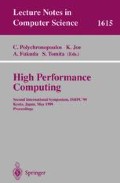Abstract
We present PARDISO, a new scalable parallel sparse direct linear solver on shared memory multiprocessors. In this paper, we describe the parallel factorization algorithm which utilizes the supernode structure of the matrix to reduce the number of memory references with Level 3 BLAS. We also propose enhancements that significantly reduce the communication rate for pipelining parallelism. The result, is a greatly increased factorization performance. Furthermore, we have investigated popular shared memory multiprocessors and the most popular numerical algorithms commonly used for the solution of the classical drift-diffusion and the diffusion-reaction equations in semiconductor device and process simulation. The study includes a preconditioned iterative linear solver package and our parallel direct linear solver. Moreover, we have investigated the efficiency and the limits of our parallel approach. Results of several simulations of up to 300'000 unknowns for three-dimensional simulations are presented to illustrate our approach towards robust, parallel semiconductor device and process simulation.
The work of O. Schenk was supported by a grant from the Cray Research and Development Grant Program and the Swiss Commission of Technology and Innovation under contract number 3975.1.
Preview
Unable to display preview. Download preview PDF.
References
Integrated Systems Engineering AG. DESSIS-ise Reference Manual. ISE Integrated Systems Engineering AG, 1998.
Integrated Systems Engineering AG. DIOS-ise Reference Manual. ISE Integrated Systems Engineering AG, 1998.
G. Heiser, C. Pommerell, J. Weis, and W. Fichtner. Three-dimensional numerical semiconductor device simulation: Algorithms, architectures, results. IEEE Transactions on Computer-Aided Design, 10(10):1218–1230, 1991.
J.W.H. Liu. Modification of the Minimum-Degree algorithm by multiple elimination. ACM Transactions on Mathematical Software, 11(2):141–153, 1985.
G. Karypis and V. Kumar: Analysis of multilevel graph algorithms. Technical Report MN 95-037, University of Minnesota, Department of Computer Science, Minneapolis, MN 55455, 1995.
C.C. Ashcraft, R.R. Grimes, J.G. Lewis, B.W. Peyton, and H.D. Simon. Progress in sparse matrix methods for large linear systems on vector supercomputers. The International Journal of Supercomputer Applications, 1(4):10–30, 1987.
E. Rothberg and A. Gupta. An evaluation of left-looking, right-looking, and multifrontal approaches to sparse, Cholesky factorization on hierarchical-memory machines. International Journal of High Speed Computing, 5(4):537–593, 1993.
E. Rothberg. Exploiting the memory hierarchy in sequential and parallel sparse Cholesky factorization. PhD thesis, Stanford University, 1992. STAN-CS-92-1459.
E.G. Ng and B.W. Peyton. A supernodal Cholesky factorization algorithm for shared-memory multiprocessors. SIAM Journal of Scientific Computing, 14(4):761–769, 1993.
Integrated Systems Engineering AG. SUPER-ise reference Manual. ISE Integrated Systems Engineering AG, 1998.
I.S. Duff, R.G. Grimes, and J.G. Lewis. Users' guide for the Harwell-Boeing sparse matrix collection (release 1). Technical Report RAL-92-086, Rutherford Appleton Laboratory, 1992.
A. Liegmann. Efficient Solution of Large Sparse Linear Systems. PhD thesis, ETH Zürich, 1995.
J.W.H. Liu. The role of elimination trees in sparse, factorization. SIAM Journal on Matrix Analysis & Applications, 11(1):134–172, January 1990.
P. Matstoms. Parallel sparse QR factorization on shared memory architectures. Parallel Computing, 21:473–486, 1995.
R. Menon L. Dagnum. Open MP: An Industry-Standard API for Shared-Memory Programming. IEEE Computational Science & Engineering, 1:46–55, 1998.
O. Schenk, K. Gärtner, and W. Fichtner. Efficient sparse LU factorization with left-right looking strategy on shared memory multiprocessors. Technical Report 98/40, Integrated Systems Laboratory, ETH Zurich, Swiss Fed. Inst. of Technology (ETH), Zurich, Switzerland, Submitted to BIT Numerical Mathematics, 1998.
Y. Saad. Iterative Methods for Sparse Linear Systems. PWS Publishing Company, 1996.
G.L.G. Sleijpen, H.A. van der Vorst, and D.R. Fokkema. BiCGSTAB(I) and other hybrid Bi-CG methods. Technical Report TR Nr. 831, Department of Mathematics, University Utrecht, 1993.
D.R. Fokkema. Subspace methods for linear, nonlinear, and eigen problems. PhD thesis, Utrecht University, 1996.
Author information
Authors and Affiliations
Editor information
Rights and permissions
Copyright information
© 1999 Springer-Verlag Berlin Heidelberg
About this paper
Cite this paper
Schenk, O., Gärtner, K., Fichtner, W. (1999). Application of parallel sparse direct methods in semiconductor device and process simulation. In: Polychronopoulos, C., Fukuda, K.J.A., Tomita, S. (eds) High Performance Computing. ISHPC 1999. Lecture Notes in Computer Science, vol 1615. Springer, Berlin, Heidelberg. https://doi.org/10.1007/BFb0094923
Download citation
DOI: https://doi.org/10.1007/BFb0094923
Published:
Publisher Name: Springer, Berlin, Heidelberg
Print ISBN: 978-3-540-65969-3
Online ISBN: 978-3-540-48821-7
eBook Packages: Springer Book Archive

